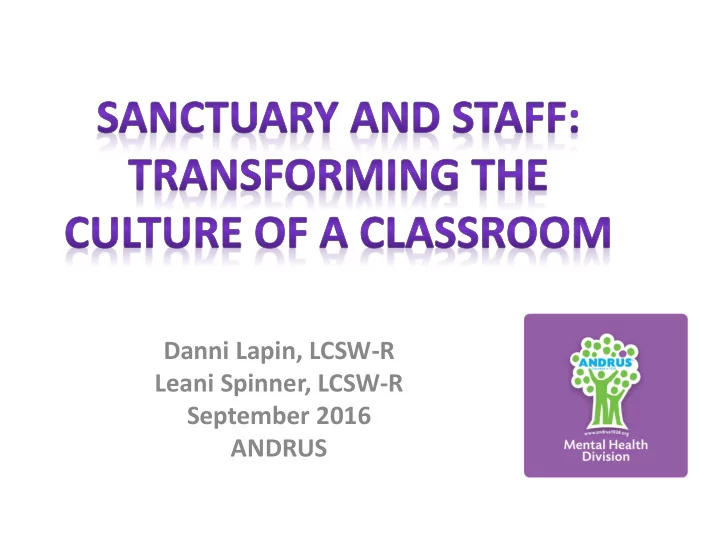

Danni Lapin, LCSW-R Leani Spinner, LCSW-R September 2016 ANDRUS
WHO ARE WE? • ANDRUS • Private, social sector • Mission: ANDRUS nurtures social and emotional well- being in children and their families by delivering a broad range of vital services and by providing research, training and innovative program models that promote standards of excellence for professional performance in and beyond our service community. • Mental Health Division: clinic-based & school-based clinical services in Yonkers, White Plains & Peekskill, NY
In a nutshell…..Sanctuary is a treatment and organizational change model that integrates trauma theory with the creation of therapeutic communities which provide safety for both clients and the staff who work with them.
A belief that adversity is an inherent part of human life, and that many of the behaviors that lead clients to care are directly related to those experiences – and that people and groups of people can heal from those experiences A perspective that asks: “what’s happened to you?” rather than “what’s wrong with you?” when organizing goals and assessing strengths and challenges
THE FOUR PILLARS OF SANCTUARY SANCTUARY TOOLKIT TRAUMA THEORY SANCTUARY S.E.L.F COMMITMENTS
How are you feeling? What is your goal? Who can you ask for help?
“What's wrong with you?" TO “What happened to you?”
TRAUMA Coping Adversity
Human If it Works, Help! Change Beings Are Do It Signaling means Creatures Again, distress loss of Habit Again!
People who engage in reenactments are not consciously choosing to repeat painful or negative relationships. The behavior patterns people exhibit during reenactments have become ingrained over time because they: • Are familiar and helped the person survive in other relationships • Reinforce the notion that the world is predictable which means safer even if it is negative • Allows the person to vent frustration, anger, and anxiety • Gives the person a sense of mastery over the old traumas “I am strong, I can handle anything”
Helpless Martyr Overwhelmed Harried Inadequate Guilt-trips Entitled Only I can help PERSECUTOR Denies vulnerability Critical, blaming Rigid, bullying
YOU THE OTHER GUY REENACTMENT
DISRUPTED ATTACHMENT MALADAPTIVE BEHAVIOR INTOLERABLE FEELINGS
Are we If not, are How do we In what helping the we change the person to ways? reenacting outcome? change? something?
15
16
Innovation cannot be planned or predicted – it emerges over time Innovation emerges from the bottom up Innovation is inefficient Leaders must create the time and space for innovation to emerge Innovative teams are self-managing and practice deep listening Team members build on their collaborators’ ideas Only afterwards does the meaning of each idea become clear Surprising questions emerge
Think about the person’s history and your own! Consider the role you are playing What is the expected response based on the script being replayed? Change the ending of the story!
The cumulative transformative effect on the helper of working with survivors of traumatic life events, both positive and negative. Saakvitne & Pearlman, 1996
No time, no energy Disconnection Social withdrawal Sensitivity to violence Alterations in sensory experiences – symptoms of PTSD Nightmares Cynicism Despair and hopelessness Diminished self-efficacy Changes in identity, worldview, spirituality
Past history of trauma Overwork Poor respect for boundaries Too high caseload of trauma survivors Less experience Too much exposure High % traumatized children, particularly sexually abused children Too many negative clinical outcomes
Social support Supervision and consultation Resolution of one’s personal issues Strong ethical principles of practice Knowledge of theory On-going training Competence in practice strategies Awareness of the potential and impact of VT
THE SANCTUARY MODEL TOOLKIT Community meetings Core Team Training Safety Plans Psychoeducation Service Planning Team Meetings Red Flag Meetings Self Care Plans Supervision and Coaching
GROUP ACTIVITY: SELF-CARE PLAN
Danni Lapin, LCSW-R dlapin@jdam.org Leani Spinner, LCSW-R lspinner@jdam.org • “THE SECRET OF CHANGE • “ LIFE IS CHANGE. IS TO FOCUS ALL OF YOUR GROWTH IS OPTIONAL. ENERGY, NOT ON CHOOSE WISELY.” FIGHTING THE OLD, BUT – Karen Kaiser Clark ON BUILDING THE NEW.” – Socrates
Recommend
More recommend